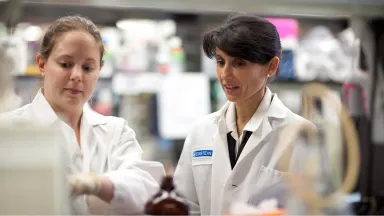Research Development Core
The mission of the Research Development Core (RDC) of the E-NSC is to act as a research incubator, developing new avenues of geroscience and gerotherapeutics research and recruiting new investigators in the field. We prioritize efforts to fund promising early-stage and ‘new to aging’ investigators to strengthen the quality, number, and diversity of research faculty conducting aging research at Einstein. The RDC also provides geroscientists worldwide with direct access to the other E-NSC cores, including unique biological samples and state-of-the-art research technologies, thereby increasing our reach and impact outside of Einstein.
Personnel
Director: Esperanza Arias, Ph.D. and David Fooksman, Ph.D.
Pilot & Feasibility Awards
The RDC is home to two different pilot and feasibility (P&F) programs, the P&F Incubator Award (internal) and the P&F Accelerator Award (core usage). As its name implies, the Incubator Award helps nurture and “hatch” new geroscientists at Einstein. The Accelerator Award jump-starts new aging efforts by funding NSC core usage by researchers at Einstein and across the country:
- In the last five years, we funded 20 internal P&F Incubator Awards (previously known as P&F projects). To date, over 50% of awardees have obtained independent funding, shared their findings in peer-reviewed journals, and undertaken new collaborations across the center. We identified promising new faculty with the potential to transition to aging research and assigned senior E-NSC members to closely mentor them on their projects and support new aging-related proposals. Importantly, awardees are integrated into various E-NSC activities.
Call for P&F Incubator Awards Applications - In addition, the RDC has funded 20 P&F Accelerator Awards. This strategy allows us to support many meritorious projects from internal and external investigators with rapid deployment of our cores. Accelerator Awards are evaluated on a rolling basis.
Call for P&F Accelerator Awards Applications
Mentoring and Education
All P&F awardees receive individual mentorship from the E-NSC faculty or relevant core faculty. The E-NSC RDC also provides programs, seminars, and work-in-progress sessions to train early-career scientists interested in aging research. The E-NSC provides a “Biology of Aging” graduate course for recipients of P&F awards, T32 fellows, and other interested faculty, in addition to a new early-career faculty mentoring program, the Aging Seminar Series, and special events such as internal hackathons. These programs have disseminated knowledge about geroscience to those with diverse interests, skill sets, and experience.
P&F Awardees
| Investigator | Dept | Project Title | Mentor |
|---|---|---|---|
| David Zhu | Radiology | Developing novel mouse brain MRI imaging to studying aging | Huffman |
| Wei Chen | DMB, Medicine | Calciprotein particles and vascular aging | Milman |
| Nicholas Sibinga | DMB, Medicine | Studying vascular Aging using hetrochronic parabiosis | Huffman |
| Molly Fisher | Medicine | Urine Extracellular Vesicle Differences in Kidney Aging | Michael Ross |
| J Choi | Biostatistics | Mechanisms that link Aging with Cancer Risk | Augenlicht |
| Maria Maryanovich | Cell Bio | Reactive oxygen species (ROS) as neural signal transducers in the aging | Barzilai |
| Seiya Kitamura | Biochem | Restoring proteostasis through small molecule-induced degradation of soluble epoxide hydrolase | Cuervo |
| Michael Ross | DMB | The effects of antiretroviral therapy upon kidney cellular senescence | n/a |
| Jihan Behnan | Medicine | The Landscape of Aging in Glioblastoma Microenvironment | Barzilai |
| Seiya Kitamura | Biochem | Restoring proteostasis through small molecule-induced degradation of soluble epoxide hydrolase | Cuervo |
| Nicholas Sibinga | DMB | Atherosclerosis and aging of the vascular wall | n/a |
| Angela Lombardi | M&I | Pinpointing ER-Phagy in Aging Beta-Cell | Singh |
| Laura Cheney | Pathology | Crossroads of HIV in the Aging Brain and Autophagy | Milman |
| David Fooksman | Pathology | Aging Enhances Plasma Cell Competition | Huffman |
| Sofia de Oliveira | DMB | Understanding neutrophil function in age-related immunometabolic dysfunction | Cuervo |
| Simone Sidoli | Biochemistry | Identifying markers of accessible heterochromatin in centenarians to understand healthspan | Milman |
| Richard Kitsis | Cell Bio | Fundamental senescence-cell death decisions and optimal cell death programs in senolysis | n/a |
| Sayan Nandi | DMB | Microglial protein Iba1 in age-related mood and cognitive decline and neuronal injury | n/a |
| Jessica Mar | Systems & Comp Bio | Characterizing heterogeneity in Metformin action in aging mouse liver and adipose at a single-sell resolution using sc-RNA-SEQ | Barzilai |
| Fabian Delahaye | Genetics | Single cell on microglia | n/a |




